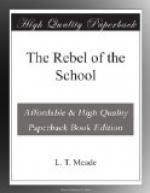“Why have you shut the shop?” said Mrs. Hopkins in an annoyed voice. “It is only a very little past half-past eight, and I saw two poor women outside. They wanted a penn’orth of paper each. They said, ’We thought you always kept open until nine o’clock,’ Now it will spread all over the place that I shut at half-past eight. Why did you do it, Susy? It’s hard enough to make ends meet without adding any more difficulties.”
Mrs. Hopkins stood, looking very pale and perplexed, in the parlor. Susy glanced at her mother, and could not help reflecting that the poor woman was fit to drop.
“Do sit down, mother,” she said. “I was so distracted; I have to be a good way from here at nine o’clock, I couldn’t think whatever kept you. I was obliged to shut the shop. I am sorry.”
“Well, never mind. You didn’t tell me that you were going out. I wish you wouldn’t go out so much in the evening, Susy; it does make it so hard for me. There’s no one now to help me with a bit of mending, and all your things are getting so racketed through.”
“What kept you, mother?” said Susy, ignoring her mother’s speech.
“Oh, it was your aunt. She’s in such a taking about little Peter; she’s quite certain he’s in for measles or something worse. I’m persuaded that it’s nothing but a cold. I never saw such a muddle-headed woman as your aunt Bessie. She hadn’t a thing handy in the place. I had to stay and see the doctor, and then to fetch the medicine myself, and then put the child to bed. I assure you I haven’t sat down since I left.”
“And I suppose she never thought of giving you as much as a cup of tea?” said Susy.
“No,” answered her mother; then catching sight of the teapot, she added, “You might have had the tea-things removed, Susy. I will make myself a fresh cup.”
Susy stood still for a moment. Temptation tugged at her heart. Her mother certainly required if ever a mother did require a daughter. But the Wild Irish Girls—surely they were pining for her in the distance!
“I wish I could help you, mother. I would if I hadn’t promised to go out. If you will give me the latchkey I can let myself in. You needn’t wait up; I promise to lock up carefully.”
“Very well, dear,” said Mrs. Hopkins.
She did not reproach Susy; that was not her way. She put a little kettle on the gas-stove, fetched a clean cup and saucer, and presently sat down to her belated meal.
Susy dashed upstairs. She put on her hat and jacket, snatched up a pair of gloves, and the next moment was out of the house.
“Free at last,” she thought. “But, oh, what an evening I have had! I must say it is horrid to be poor. Now, if I was rich like Kathleen, wouldn’t I have a gay time of it? Poor dear mother should drive in a carriage, and I’d ride on my pony by her side; and Tom should be a public school boy. There’d be no horrid shop then, and no horrid women coming in for ha’p’orths and penn’orths of paper.”




